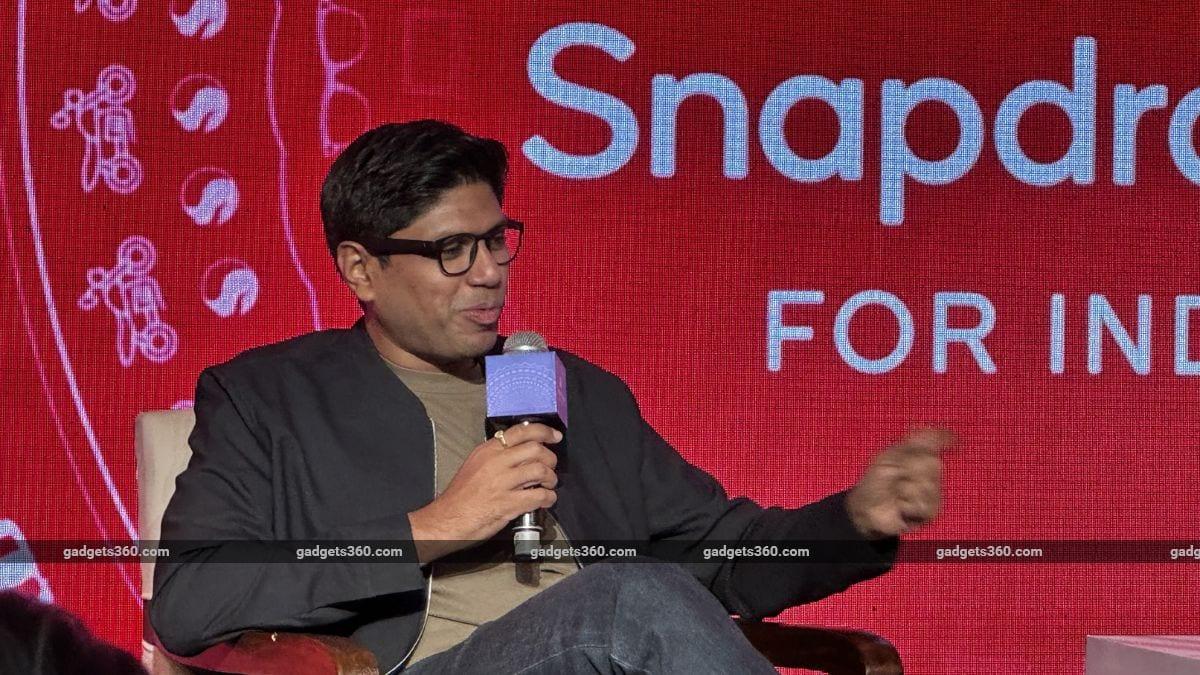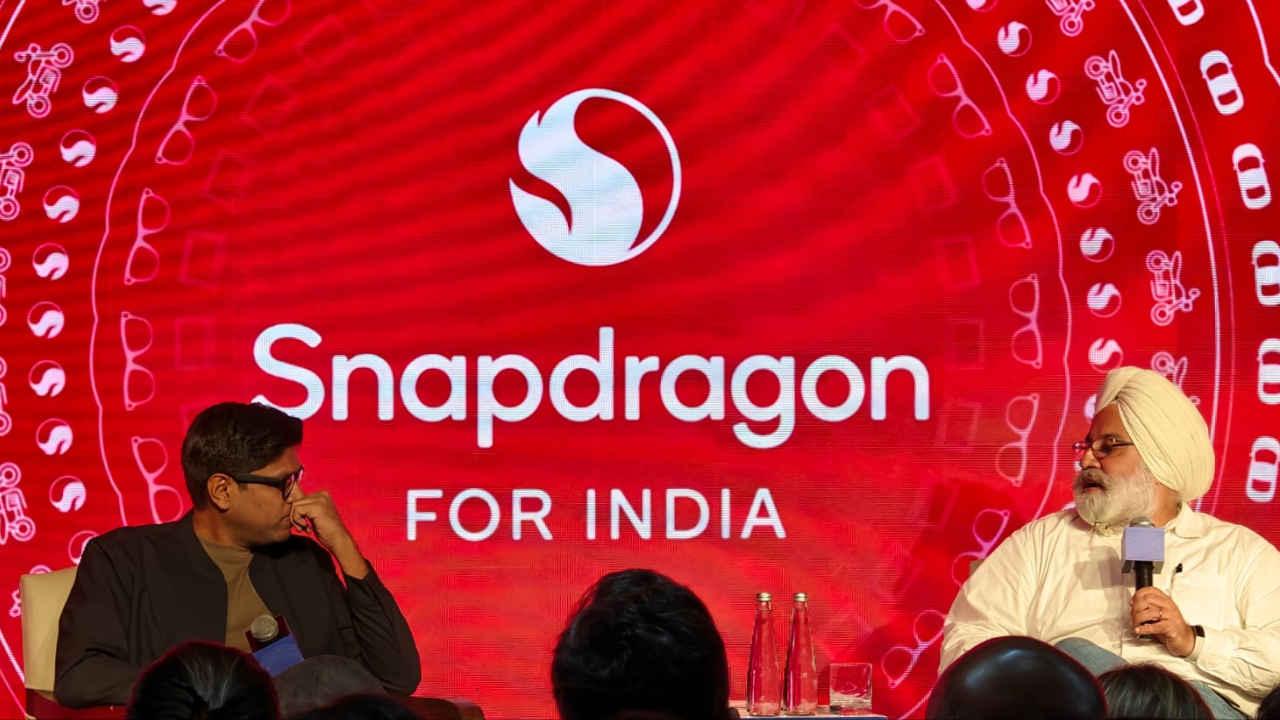Qualcomm's Snapdragon XR Day Showcases AI-Powered Smart Glasses, Including Lenskart Partnership
5 Sources
5 Sources
[1]
Lenskart Will Use Snapdragon Chips in Upcoming Smart Glasses
The announcement was made at Snapdragon for India XR Day on July 21 Lenskart is working on a new pair of smart glasses, co-founder and CEO Peyush Bansal announced at the Snapdragon for India XR Day held in New Delhi on Monday. While most of the information remains under wraps, the purported Lenskart smart glasses are confirmed to utilise chipsets made by Snapdragon. These will be the second smart glasses from the eyewear company, building upon the introduction of the Lenskart Phonic in February this year. Lenskart co-founder Peyush Bansal teased the development of Lenskart smart glasses during a fireside conversation with Savi Soin, Senior Vice President and President of Qualcomm India at the Snapdragon for India XR Day. While talking about the company's recent innovations in terms of eyewear, Bansal also teased that Lenskart is working on a new pair of smart glasses in collaboration with Qualcomm. As a fruit of this partnership, this wearable will use a Snapdragon chipset under the hood. However, it remains to be seen whether it will be an augmented reality (AR) offering or a simple pair of artificial intelligence (AI) smart glasses like the Ray-Ban Meta. In the case of the former, the smart glasses could be powered by the Snapdragon AR1 Gen 1 SoC, which is used by AI glasses with and without screens. If Lenskart decides to make it a premium augmented reality experience, it could even equip it with the latest Snapdragon AR2 Gen 1 chipset. On the other hand, if the upcoming offering turns out to be a simple pair of AI glasses, it may even use the Snapdragon W5 Gen 1 chip. Notably, this would be the second pair of smart glasses from the company. The Lenskart Phonic, priced at Rs. 4,000, allows users to take calls, listen to music, and interact with the AI voice assistant. Music is played through the built-in speakers placed at the temples, promising up to seven hours of playtime on a single charge. The glasses are claimed to support multi-tasking and a connected experience on-the-go.
[2]
Qualcomm hosts XR Day in India, signaling a push towards spatial computing growth
Qualcomm today hosted XR dayThe brand also showcased their partner productsLens Kart's Peyush Bansal was also present at the eventQualcomm Technologies opened its 'Snapdragon for India - XR Day' event, bringing together developers, tech experts, creators, and industry stakeholders to explore the future of spatial computing in India. The event offered a look into real-world applications of extended reality, with demos spanning entertainment, fitness, education, and content creation showcasing the growing interest and innovation around smart glasses and immersive tech. At the event, Savi Soin, Senior Vice President and President of Qualcomm India, spoke about India's growing role in shaping the future of spatial computing. He noted that smart glasses could soon become as commonplace as smartphones, handling daily tasks through intuitive, AI-powered interfaces. Soin emphasized the importance of designing devices that are both lightweight and powerful -- qualities Qualcomm aims to balance with its Snapdragon platforms. He also highlighted the broader potential of this technology to support digital inclusion -- whether by empowering frontline workers, enabling remote education, or improving access in underserved areas. As Qualcomm expands its focus beyond smartphones, the company continues to invest in spatial computing as a key growth area, aligning its efforts with India's larger push toward a digitally empowered future. Speaking at XR Day, Alex Katouzian, Group General Manager of Mobile, Compute & XR (MCX) at Qualcomm Technologies, shared how Snapdragon XR platforms already powering over 100 immersive devices globally are shaping the next phase of computing through MR, VR, and AR. He outlined how AI is becoming integral to the XR experience, with systems increasingly capable of interpreting visual and audio input to deliver more intuitive, context-aware interactions. During the keynote, Katouzian showcased a small language model running entirely on a pair of AI-powered glasses, illustrating how Snapdragon can support AI across cloud, local, and on-device environments. The company also shared updates on its collaboration with Indian eyewear brand Lenskart, which is working on smart glasses powered by Snapdragon chipsets. The partnership signals Qualcomm's continued push to bring AI-enabled wearables to the Indian market.
[3]
Qualcomm Snapdragon XR Day: AI smart glasses, Lenskart partnership, and On-device XR tech unveiled
Qualcomm Technologies launched its 'Snapdragon for India - XR Day' event focused on advancing India's spatial computing ecosystem. This event comes ahead of the upcoming Snapdragon Auto Day on July 30, co-hosted with Amazon Web Services (AWS), which will spotlight automotive technologies like ADAS and in-car connectivity shaping smart mobility. At XR Day, top Indian tech experts, developers, industry partners, media, and creators gathered to explore Qualcomm's role in driving India's smart glasses and extended reality innovation. The event showcased immersive demos across entertainment, content capture, fitness, and education, illustrating the expanding potential of spatial computing. Alex Katouzian, Group GM of Mobile, Compute & XR at Qualcomm, highlighted the Snapdragon XR platforms powering over 100 immersive devices worldwide, delivering exceptional experiences in mixed reality (MR), virtual reality (VR), and augmented reality (AR). He stressed AI's vital role in XR's growth, enabling devices to "see" and "hear" for personalized, intuitive experiences. A live demonstration featured a small language model running entirely on AI-enabled smart glasses, showcasing Snapdragon's versatility across cloud, local, and on-device AI processing. Qualcomm also revealed partnerships powering AI-enabled smart eyewear for Indian consumers, including collaboration with Lenskart using Snapdragon chipsets. This underlines Qualcomm's commitment to expanding beyond smartphones and accelerating India's leadership in spatial computing innovation. Speaking at the event, Savi Soin, Sr. Vice President & President, Qualcomm India, commented:
[4]
Snapdragon XR Day 2025: Qualcomm wants smart glasses to become as important as phones
Qualcomm also announced that the Snapdragon chipsets will power smart glasses in India. Qualcomm Technologies today kickstarted its Snapdragon for India XR Day event. The event aimed to accelerate the growth of spatial computing in the Indian market. Qualcomm took this opportunity to showcase a range of innovations across content capture, entertainment, fitness and education. The company also emphasised the growing need for spatial computing in today's digital landscape. At the event, Savi Soin, Sr Vice President & President at Qualcomm India, said that the company imagines a future where smart glasses are just as essential to our daily lives as smartphones are today. "Qualcomm Technologies envision a future where smart glasses become as integral to daily life as smartphones, seamlessly handling everyday tasks. Snapdragon platforms are engineered to deliver a balance of sleek, lightweight design with powerful functionality, making smart glasses practical and intuitive for everyday use," Soin said. "Aligned with the vision of Viksit Bharat, this technology will empower frontline workers, transform education in remote areas, and enable truly inclusive digital access." Alex Katouzian, Group General Manager of Mobile, Compute & XR (MCX) at Qualcomm Technologies,took the stage to share insights on Snapdragon XR. He highlighted that Snapdragon XR platforms, which have already powered over 100 devices worldwide, continue to drive results across augmented reality (AR), mixed reality (MR), and virtual reality (VR). Also read: Google Pixel 9 Pro XL price drops by Rs 30,000 on Flipkart: Check deal details here Qualcomm also announced that the Snapdragon chipsets will power smart glasses in India. These wearables are being developed in collaboration with brands like Lenskart, signaling Qualcomm's strong push to introduce AI-powered smart eyewear to Indian consumers. During the event, Qualcomm also hinted at the arrival of Xiaomi's AI glasses, which launched in China in June, priced at CNY 1,999 (roughly Rs 24,000).
[5]
Xiaomi AI glasses appear at Qualcomm's Snapdragon XR day, is India launch imminent?
Xiaomi AI Glasses are already commercially available in China. Qualcomm hosted its Snapdragon for India XR Day event in New Delhi, where the Xiaomi AI Glasses made a low-key appearance, sparking speculation about a possible India launch. While there was no official announcement from Xiaomi about whether it is launching the smart glasses in India, it's presence at an event focused on the Indian XR ecosystem suggests that the company might be testing the waters for a future release. Qualcomm's XR event focused on the growing role of spatial computing in India and featured remarks from Qualcomm India President Savi Soin and GM, Mobile, Compute and XR (MCX) Business Unit, Alex Katouzian. Both highlighted the growing relevance of smart glasses and spatial tech and how Qualcomm was powering these experiences. In addition, Qualcomm confirmed that Snapdragon chipsets will power a range of upcoming smart glasses in India, developed in collaboration with companies like Lenskart. Xiaomi, however, was not specifically mentioned in the list of partners. Also read: Snapdragon XR Day 2025: Qualcomm wants smart glasses to become as important as phones That said, the Xiaomi AI Glasses themselves are already commercially available in China, where they launched in June for CNY 1,999 (approx. Rs 24,000). Weighing only 40 grams, Xiaomi's glasses offer 2K video recording, a 12MP Sony IMX681 sensor, and feature-rich capabilities like EIS video stabilisation, bone-conduction microphones, electrochromic lenses, and support for live streaming. They even house a 263mAh Surge Battery capable of delivering 8.6 hours of continuous use -- double what Ray-Ban Meta offers -- charging via USB-C without needing a proprietary case. The glasses run Xiaomi's HyperOS, allowing seamless pairing with smartphones, remote camera control, and gesture-based lens switching, all designed to fit into your daily workflow, not disrupt it. There's no confirmation yet on global availability or a specific India release timeline. However, Xiaomi's decision to showcase the glasses during an India-focused Qualcomm event is notable. Whether this was a one-off demo or the beginning of a wider rollout remains to be seen. For now, Indian consumers will have to wait and watch.
Share
Share
Copy Link
Qualcomm's Snapdragon XR Day event in India highlighted the future of spatial computing, featuring AI-powered smart glasses and partnerships with companies like Lenskart, signaling a push towards making smart eyewear as essential as smartphones.
Qualcomm's Vision for Smart Glasses
Qualcomm Technologies recently hosted its 'Snapdragon for India - XR Day' event in New Delhi, showcasing the future of spatial computing and smart eyewear. Savi Soin, Senior Vice President and President of Qualcomm India, emphasized the company's vision of smart glasses becoming as integral to daily life as smartphones
2
. This aligns with Qualcomm's broader strategy to expand beyond smartphones and accelerate India's leadership in spatial computing innovation3
.Snapdragon-Powered Smart Glasses
A key announcement at the event was Qualcomm's collaboration with Indian eyewear brand Lenskart to develop smart glasses powered by Snapdragon chipsets
1
2
. While details remain limited, this partnership signals Qualcomm's commitment to bringing AI-enabled wearables to the Indian market. Lenskart CEO Peyush Bansal teased the development during a fireside conversation at the event1
.
Source: Gadgets 360
AI Integration in XR Experiences
Alex Katouzian, Group General Manager of Mobile, Compute & XR at Qualcomm Technologies, highlighted the crucial role of AI in enhancing XR experiences
2
. He demonstrated a small language model running entirely on AI-enabled smart glasses, showcasing Snapdragon's versatility in supporting AI across cloud, local, and on-device environments3
.Snapdragon XR Platforms
Qualcomm's Snapdragon XR platforms are already powering over 100 immersive devices globally, delivering experiences in mixed reality (MR), virtual reality (VR), and augmented reality (AR)
3
. These platforms are designed to balance sleek, lightweight design with powerful functionality, making smart glasses practical for everyday use4
.Potential Impact and Applications
The event featured immersive demos across various sectors, including entertainment, content capture, fitness, and education
3
. Qualcomm emphasized the potential of this technology to support digital inclusion by empowering frontline workers, enabling remote education, and improving access in underserved areas2
.Related Stories
Xiaomi AI Glasses Appearance

Source: Digit
Interestingly, Xiaomi's AI glasses, which launched in China in June, made a low-key appearance at the event
5
. While no official announcement was made regarding an India launch, their presence at the event has sparked speculation about a possible release in the Indian market5
.Future Outlook

Source: Digit
As Qualcomm continues to invest in spatial computing as a key growth area, the company envisions a future where smart glasses can handle daily tasks through intuitive, AI-powered interfaces
2
. This push towards making smart eyewear as essential as smartphones aligns with India's larger push toward a digitally empowered future2
4
.References
Summarized by
Navi
[1]
[3]
Related Stories
Recent Highlights
1
OpenAI secures $110 billion funding round from Amazon, Nvidia, and SoftBank at $730B valuation
Business and Economy

2
Anthropic stands firm against Pentagon's demand for unrestricted military AI access
Policy and Regulation

3
Pentagon Clashes With AI Firms Over Autonomous Weapons and Mass Surveillance Red Lines
Policy and Regulation








